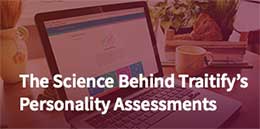It starts with knowledge. The old saying “knowledge is power” sounds trite — but it’s really true. Knowledge — of people and their different personality styles — is the first step toward driving team compatibility and avoiding conflict.
First, let’s talk about conflict. Conflict at work is no laughing matter. Most people have experienced some form of conflict at work.
These conflicts can have far-reaching consequences; one in seven clashes or unworkable relationships lead to productivity drops, according to a recent survey.
“It is also relatively common,” CIPD, the HR organization that conducted the survey, “that relationships reach the point where they are recognized to be unworkable to the point where one or other party either changes job roles, resigns or (less commonly) is dismissed. Overall, someone leaves their job one way or another in one in ten cases (9%) of what we are prepared to call conflict.” And in five percent of cases, conflict literally makes people ill.

CIPD also found that almost half of workplace conflict (44%) is rooted in personality differences. “By a clear margin,” the survey authors wrote, “the single most common cause or contributor is differences in personality or styles of working. At source this may be because we fail to understand difference, or it may simply be a frustration with or dislike of a colleague’s style, or it may be historic, having roots in past behavior that has caused hurt or created grudges.”
These conflicts are also the ones that people are least likely to do anything about — instead of talking to a supervisor or going to HR, they are more likely to let these conflicts simmer until the whole thing boils over into a hot mess.
“Employees also find disputes rooted in personality clashes among the most insurmountable: …in these conflicts we are substantially more likely to look for a new job,” the authors wrote.
So what’s the answer? Knowledge is a good first step.

In our guide, we share advice from our executive director of psychology, Bev Betz, who suggests that all employees take a personality test or a self-assessment to learn about their own communication styles and working preferences. Betz also suggests that employees share these results with their teammates. “I would want every member of the team to know the [types] of every other member of the team,” she says. “This shows every team member’s strengths.” With Traitify’s careers assessment, “this isn’t like an IQ test where there’s a winner and a loser,” says Betz. “There are strengths in every one of these types, and it can only benefit you to know yourself, and to know what your vulnerabilities are.”
Workplace analytics company Predictive Advantage agrees. In a blog post, the company wrote: “Doesn’t it therefore stand to reason, that the more we know about a person’s personality, the better we can judge their actions, reactions and needs? Their behavior becomes more predictable.”
Of course, just knowing that someone is different from you is only the start: teams work best when everyone trusts each other there is trust and when everyone is comfortable sharing information without a fear of being shot down or hurt. That means that you may have to rein in some of the more dominant personalities on your teams. Wharton Executive Education fellow Mario Moussa says that over half the time, people don’t share what they’re thinking. But teams make better decisions when they have more information, which means that people staying quiet when they should speak up are a concern.
As a manager, you can head off some of these problems in the way you structure your teams — not putting two headstrong leaders together, or by rounding out a team of creatives with a more down-to-earth doer — but also by making sure that all those creatives understand why that focused doer is on the team. Hint: the answer isn’t “to slow us down.” It’s to make sure that at least one of the amazing, creative, out-of-the-box ideas actually get made.
But to even start having that conversation, you need to know your employees’ personalities and strengths. Knowledge really is power.
Find out how we use science to give you the knowledge to create amazing teams. Try a personalized demo from Traitify to get started today!




 Subscribe to Our Blog
Subscribe to Our Blog 
